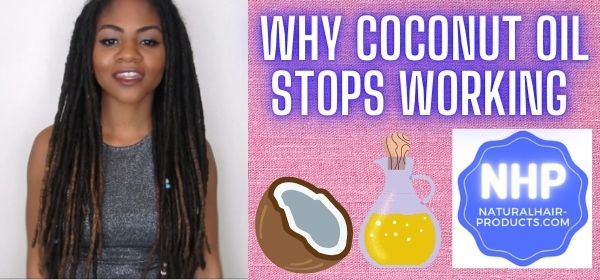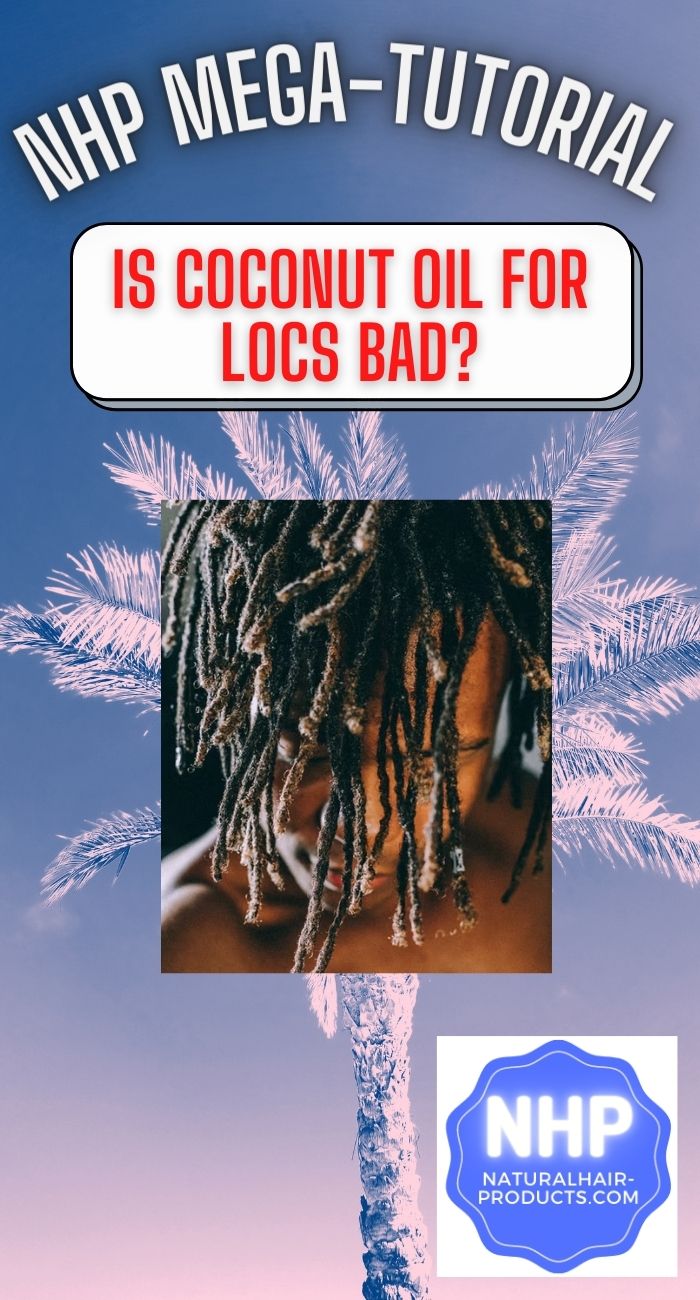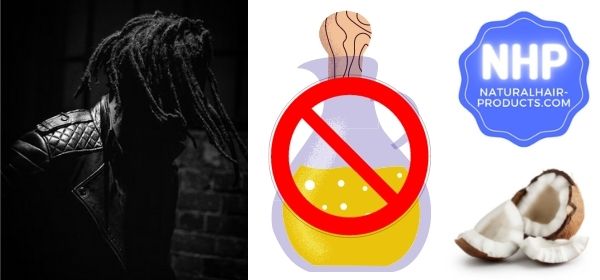Why Coconut Oil for Dreads Worked Good Before [Now it’s Bad...]
- NHP
- Natural Hairstyle Ideas
- Loc Styles
- Coconut Oil for Dreads
Is using coconut oil for dreads good or nah? The answer depends on FOUR MAJOR FACTORS -
- The amino acid needs of your locs (which can change in time).
- The climate where you live.
- How you apply coconut oil in your maintenance regimen.
- Which is the best type coconut oil to use (hint: fractionated).
Yes, coconut oil for dreadlocks is the best for some hair conditions and then, it’s a dried-out doggone disaster for some others.
In fact, sometimes a locs-wearing natural can be enjoying great moisturizing, and hair-healing success using this “holy grail” oil for months or years, and then, all of a sudden…
…the “holy grail” oil becomes the “hot mess” oil, or vice versa! Coconut oil can go from bad to good all of a sudden.
And you may feel that it’s hard to understand why. Ya know?
Today you’ll get a full understanding in this NHP Mega-Tutorial.
In this Coconut Oil for Dreads Mega-Tutorial We’ll Discuss…
So let’s get down-and-dirty into the nitty-gritty of this eye-opening information, today you’re going to discover...
- The changing protein needs of your locs & the effect coconut has
- How cooler climates can make coconut oil stiffen locs
- The proper way to apply coconut oil to dreads (if needed)
- The best type to use coconut oil for dreads (if needed)
- PLUS, get an understanding of the pros and cons of dreadlocks
Why Coconut Oil for Dreads Worked Good Before & Now it’s Bad…Your Protein Needs Change
It’s important to realize that too much of a good thing can be a bad thing.
You see:
Coconut oil isn’t the devil y’all, in fact, it can be great at giving your locs shine and luster, adding softness and manageability to your dreads.
It’s also one of the few oils that can mimic your hair's natural sebum, which allows it to penetrate deeply into the hair follicle and help stimulate your strands from the inside out.
And, I’ll give you more of the reported benefits in a whole section below.
Still though:
With all the good coconut oil does for SOME dreadlocked hair, it’s important to understand YOUR hair’s specific protein needs (or lack thereof)...
Here’s the issue:
Coconut oil is also a protein builder; it gives your hair loads of amino acids, which are the building blocks of protein. Your body also produces hair protein naturally in the form of keratin.
So, protein is a good thing fam! In general...
Protein basically serves as a protective outer layer on top of your hair strands, for example, it protects your outer hair cuticles from excess damage when being manipulated.
So, it protects if you are brushing your dreads for example, as you know many loc lovers like to do in order to remove lint build-up.
Well, that constant hair brushing can cause damage to the outer cuticles of our hair, you can also cause damage if you chemically dye your hair color or add heat to your hair. All of these things that we often do to our dreads can cause damage to the outer cuticles.
So the protein is basically that extra protection that goes over our hair shaft like a barrier, it works really well!
The problem is that not all of us need protein because not everyone has damaged hair.
As a matter of fact many locs-wearers have low porosity hair, meaning the gaps (i.e. pores) in the low-po hair are completely filled with protein, needin no more.
Even those with mid-to-high porosity hair who may need and thrive off of coconut oil amino acids may find out that after those protein needs have been met, the coconut oil starts having a negative effect.
You have to remember that our body naturally creates keratin protein by itself, so when you are adding more protein to your hair you can reach a point where your locs have too much protein.
Too much of a good thing can turn into a bad thing, because moisture can’t penetrate your locs now you've built up a protein barrier that’s way too thick and just blocking.
In such a case, there's no way that the hydration that you’re trying to apply to your dreads can get through, and that's why your locs are left really, really dry.
Fact is, whether your dreads already have enough protein or what your hair porosity type is greatly affects whether your hair has a negative reaction to coconut oil, simply tolerates it or thrives from its use.
[GO TO: Our women's natural hairstyles guide!]
Low VS High Porosity Reaction To Coconut Oil for Locs
Low porosity and high porosity hair react VERY differently to coconut oil for dreads, let’s break it down for you….
Low Porosity Blocks Penetration
When you have low porosity hair that means that you have to do extra work to open up your hair cuticle and get the oil to penetrate and do good things.
That’s because low porosity hair cuticles naturally lay down flat and tightly sealed, when low porosity hair lays down flat it's hard for any kind of hair hydration products or even water to get inside, moisturize and make your locs feel soft.
Since low porosity already has a natural barrier, you need to use tactics to make the cuticles lift up before using coconut oil.
If you don’t, then you’ll just be adding another layer of protein from the coconut oil on top of closed hair strands, now your just building double and triple barriers over your hair and there's no way that any kind of hydration and moisturization can get through that so and that's a common cause of extremely dry locs.
High Porosity Embraces Proteins
If you have high porosity hair this means that your hair cuticles are lifted up and open. It is always open and ready to receive hydration, yet it is quick to lose the hydration because of open cuticles as well.
High porosity hair dreadlocks can greatly benefit from coconut oil because that protein barrier that coconut oil gives hair will help hair seal and hold moisture inside of the strands.
High porosity hair, most times means that you have damaged hair cuticles. Even with coconut oil and other oil mixture applied, the cuticles will eventually lift back up but that extra protein barrier on your locs from coconut oil will keep cuticles closed and maintaining moisture a little bit longer.
Benefits of Coconut Oil for Dreadlocks
So before we talk about how coconut oil can cause build up on dreads in cool climates, let me show you some of the positive benefits of coconut oils so that I don’t get called a dang bully…. LOL.
- Creates a protective layer around the hair - Coconut oil is a hydrophobic liquid, which means it creates a protective shield around the dreadlocks.
This process locks in the moisture of the hair as well as keeps locs smooth and soft in texture. Coconut oil is also antibacterial, anti-viral, anti-fungal and helps prevent dandruff. - Improves scalp circulation - Coconut oil improves circulation to the scalp, in turn, supplying your scalp with the oxygen and nutrients needed for increased hair growth.
- Penetrates dry hair easier than most oils - Coconut oil is light in weight yet absorbent, thus, with proper use it penetrates the loc hair deeply and binds to the hair protein with ease making protein-deficient hair stronger and healthier.
- Can add shine and luster to dreads - As mentioned above, when coconut oil for locs is used on hair that actually needs it, it’s one of the best oils for dreadlocks to give brilliant shine and luster.
- Prevents hair loss & split ends - Dried and damaged locs have a higher chance of split ends and breaking apart easily. Coconut oil for dreads strengthens the hair. One reason for this is that coconut oil contains Linoleic acids which help hydrate dreadlocked hair and prevent breakage and excessive hair loss.
Coconut oil also works well with colored, bleached, and highly porous loc hair. Thus, it is one of the best natural oils for dreadlocks that are weak from lack of protein.
Does Coconut Oil Cause Build Up In Locs? (Yes, Especially In Cooler Temps)
Coconut oil for dreads contains vitamin E and K, which IN THEORY should leave your dreadlocks feeling soft and manageable. But…
It’s important to understand how your common coconut oil behaves in cooler climate temperatures since it will behave the same way in your locs.
This is one of the main reasons why, yes, coconut oil causes build up in locs when the oil hits cooler temperatures.
Because the most common types of virgin coconut oil solidify in low temperatures when applied to your locs it can make your hair feel stiff and attract lint.
Cooler climates on coconut oil can EASILY make your locs feel dry and more brittle than that peanut butter candy.
In contrast, warm-to-high temperatures melt coconut oil down into its liquid state, leaving your hair feeling soft and shiny.
Don’t trip if you live through cold winters though, there are many great alternative oils to use in dreads, normal coconut oil may not be the best option for people who live in cold areas like it is for folk who I live in the Caribbean.
One little trick folks don’t know about is grabbing fractionated MCT coconut oil for dreads, it doesn’t solidify at ANY temperature because of how it’s been processed.
Many experienced locticians warn their clients about this temperature-related cause of product buildup in locs.
This can cause major styling and hair health headaches for coconut oil lovers who religiously use it year-round and for everything, be it as a leave-in conditioner, a moisturizing oil, a carrier oil and everything else.
If you use normal coconut oil for dreads during frigid season you will be fighting to get rid of build up like a MICKEY-FLICKY...
Your dreads may end up looking a grayish white color and attract lint and dust like crazy, ugh….
Instead you can use moisturizing avocado oil for dreads because it's a nutrient-dense and dependable sealant oil.
Many locticians recommend sticking with argan oil and jojoba oil, still... avocado is real winner "go-to" dreadlock oil.
It’s a light oil that doesn’t freeze up and you can find some brands that smell amazing.
If you've experienced any buildup on your locs because of coconut oil email NHP and share your experience so we have more info to share with the community! We’re a team!
How To Know if Your Dreadlocks are Sensitive to Coconut Oil
Even as coconut oil works like a miracle on high porosity, damaged locks, there is also a chance that your dreadlocks are sensitive to the finicky natural oil.
To check this, apply coconut oil to two locs and monitor your hair’s reaction. Noticing dry-feeling locks after application confirms sensitivity; if the locs are soft after the application, you can use it without any fear until things change.
If your locs are sensitive to coconut oil, you can try and switch to other natural base oils like avocado oil or sunflower oil for locs.
Also, according to clinical hair studies, sensitivity isn’t permanent because hair porosity can change over time, so you can try and apply coconut oil for dreads in a few months to see its reaction on your hair again.
Coconut Oil for Dreadlocks [Damp Hair Application Hack]
Sometimes, the way you apply coconut for dreads can make all of the difference. This is a hair hack I learned from a sister named Ceraisis.
She had started out applying coconut oil to wet hair with “so-so” results.
She also used it on her loose, dry hair. The results were still nothing to write home about.
After she locked though, maybe by accident she learned to apply coconut for dreads on her damp locs.
And POW! The damp application was the winner!
How damp?
Well, she just washed her hair and then waited until her dreads had stopped dripping water, but before they lost much more moisture past the “not dripping” point.
Kind of like the moisture level jeans have when you wash them and take them out of the washer right after it's stopped spinning. They are not dripping but they are wetter than a lightweight t-shirt would be that was washed in the same load.
KEY POINT: She doesn't towel dry her locs or dry with anything else after the dripping stops. Applying a nice amount of coconut oil, she goes through her locs, making sure to get the top and bottom of the dreads.
That’s the only time she applies coconut oil for dreads until wash day rolls around a week later.
During the week, if her dreads are feeling a bit dry, she spritzes with water only. This technique softens her locs right back up.
To emphasize the difference she got from different techniques, she DID NOT get quite the same result when she started with dry locs dampened by spritzing with water.
This is a nice coconut oil for dreads hack for you to test out before throwing on your satin dreads cap!
Try using coconut oil on your locs on wash day, and don’t wait until your hair is completely bone dry. If that does not work, it might be that your hair does not agree with coconut oil.
FAQs: Can You Retwist Dreads With Coconut Oil
ANSWER: Yes, you can retwist dreads using a mixture of coconut oil and water. This is a cheap way to retwist when on a budget. You can look at Pam Oduor’s coconut oil and water retwisting technique below to see if its benefits and price point are what you have in mind.
Keep in mind that in the retwist with coconut oil for dreads video below, she doesn’t wash her hair. As you may know, a wash and retwist can get pretty expensive.
However, the wash and retwist cost at a salon with a loctician depends on a bunch of variables such as your hair length, hair thickness, loc maturity, and what method you wish to use.
FAQs: What’s The Best Way To Use Coconut Oil For Dreads?
ANSWER: For some, the best way to use coconut oil for braids is to apply to damp hair on wash day. For others, they’ve found that the best way is to apply it only to the scalp, and not directly to dreads.
If you apply coconut oil to your dreads and it solidifies, do not panic. Wash your hair with a premium clarifying shampoo and follow up with rosewater for locs (which we wrote about here) or jojoba oil instead.
Oils That May Be Better Than Coconut Oil For Locs
As mentioned above, one alternative for normal coconut oil for dreads is fractionated coconut oil because it doesn’t firm up or solidify in cool climate temperatures, helping you avoid stiff dreads in cold weather.
Here are a couple popular brands of fractionated coconut oil and some good alternate oils for dreads as well…
ALTERNATE OILS FOR DREADLINKS:
- Avocado Oil - Native Harvest USDA Organic
- Sunflower Oil - Baja Precious - High Oleic
- Extra Dark 100% Natural Black Jamaican Castor Oil with Coconut Oil









